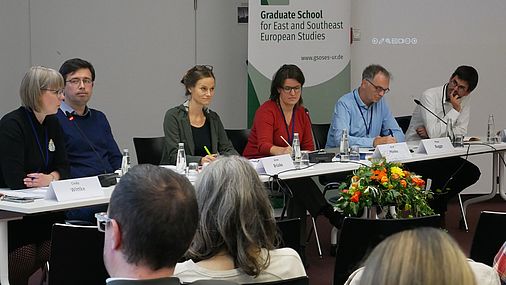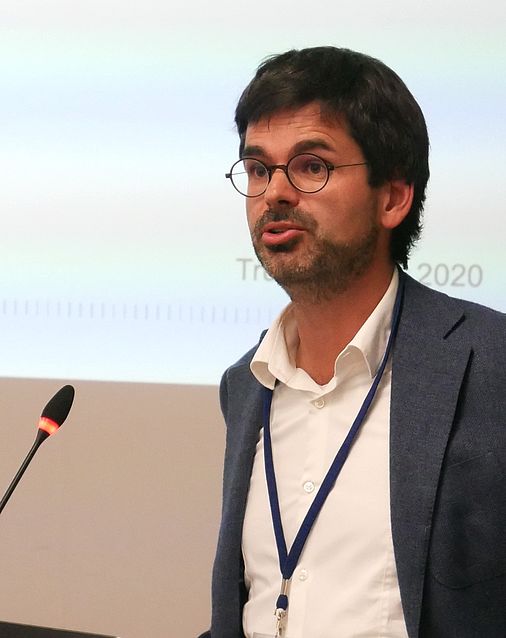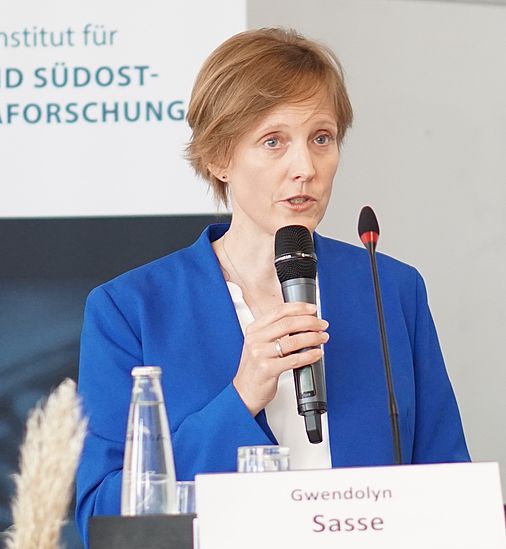(Re-)Ordering Eastern Europe
IOS Annual Conference 2023 in Regensburg – Keynotes addressing terminological pitfalls, geopolitics, and knowledge hierarchies.
26 October 2023
‘(Re-)Ordering Eastern Europe’ is a challenging and long-term endeavor. There is no masterplan. That the term “Eastern” is often used to cover East-Central Europe, Southeastern Europe, the South Caucasus, and even Central Asia does not make things easier. At the Leibniz Institute for East and South East European Studies (IOS) Annual Conference on 12/13 October 2023 in Regensburg, international scholars from various disciplines discussed a world region “marked by constant re-negotiations and re-adjustments of centers and balances of power, as well as of security arrangements involving volatile and fragmented coalitions”, as organizers Dr. Cindy Wittke, Head of the IOS Political Science Research Group, and Professor Dr. Ulf Brunnbauer (IOS Academic Director) described the current situation in their invitation.
Through the prism of war in Ukraine, Regensburg scholars, including early career researchers, together with their colleagues from Germany and abroad focused on a variety of topics, such as resilience, digital politics, secession and fragmentation processes in the post-Soviet space, or (transitional) justice during and after war. The event featured conference panels interspersed with discussions and multidisciplinary conversations.

At the Leibniz Institute for East and South East European Studies (IOS) Annual Conference 2023 in Regensburg. Credit: Franz Kurz
The two keynote talks saw two scholars engaging critically with the approaches, content, and output of their scientific community: Martin Müller, professor in the Department of Geography and Sustainability at the University of Lausanne, an international expert on the sustainability of major (sports) events and cultural institutions (such as museums or theatres), and Gwendolyn Sasse , Academic Director of the Berlin Center for East European and International Studies (ZOiS) and Einstein Professor for the Comparative Study of Democracy and Authoritarianism at the Department of Social Sciences at the Humboldt-Universität zu Berlin.
As both keynote talks showed, there are still plenty of fruitful debates to be had over the terminology employed. “Decolonising decolonialism – Worlding global theory with Eastern Europe”, as Martin Müller’s keynote was titled, explored the complexity of wor(l)ding while recommending greater use of global and social cultural theory when it comes to answering the important questions of our time. He emphasized that the decolonial turn has been on the up in recent years, as have scholarly efforts to displace Western rationality as the dominant framework of existence, analysis and thought. “The Easts”, Müller said, have been missing in decolonial theory, being “unnoticed blindspots”; the Easts’ scientists, for instance those from the post-Soviet space, have mostly remained outside theory building: “Decolonial theory inverts the Eurocentric gaze, but does not subvert its field of vision”, he argued.
The “Global South”, 1492, and “Othering”
Müller outlined, four reasons for this situation: the first are prevailing “spatialities,” with a “hemispheric fallacy” meaning scholarship has typically split the world space into the Global North and the Global South. The latter has become shorthand for the world of non-European, postcolonial peoples – and excluded the Easts. Müller’s second point focused on “temporalities” and the “1492 fixation”, whereby the European ‘discovery’ of the Americas, with Europe’s emergence as the dominant power in the Atlantic, becoming paradigmatic in scholarship.
This, though, means empires predating the expansion European imperial projects and also shaped Eastern and Western Europe, such as the Mongol empire or the Timurid empire, have been overlooked. “History was not written by the winners but those who were able to write,” Müller noted.
The third reason Müller termed “narratives”, focusing in particular on the ensuing “Othering: The East as (demi-)other through time”. Throughout history, he argued, the dominant narratives of the East of Europe shifted with philosophical or political events: there was the “fascinating exotic East” up to Enlightenment, the ”backward East” from Enlightenment to Industrialization, the “threatening evil East” during the Cold War, and then the “failed East” – comprising the years following the Cold War.
Martin Müller, IOS Annual Conference 2023, in Regensburg. Credit: Franz Kurz
Geopolitics of knowledge
Finally, in his outline of the reasons for the Easts being a blind spot in decolonial theory, there are “epistemics”: To be able to produce knowledge access to the centers of knowledge production is crucial, Müller argued. However, there have been different levels of access to languages and “linguistic privileges for hegemonic languages”. He emphasized that “How we mediate to global knowledge production is crucial.” Müller found that the editorial board members of the most influential scientific journals in his field are comprised of almost 90 % Western scholars and with only 0,8% coming from post-socialist countries. “Knowledge produced in certain locations, mostly in Anglo-America, is ostensibly more universal, and therefore more valuable, than that produced in others”. Access to English has conferred outsized epidemic power, Müller said.
He expanded upon the consequences of Eastern Europe’s absence in decolonial theory, arguing that “epistemic enclavization” in scholarship means Eastern Europe and its scholars act as the suppliers of case studies, rather than as generators of theories. In short, area expertise eclipses systematic expertise.
“What can we do to bring the East more in?” Müller asked, bringing new terminology into play. There was the need to think towards the whole-world, he said, highlighting the relevance of the French term “mondialization”, suggesting we use “worlding” instead of “decolonizing”. He proposed further new vocabularies and approaches: “Say East, when saying South”, “Challenge totemic concepts”, “think whom you cite and decentre canonical authors”. He pleaded also for increasing the use of languages other than English. “See it as a resource, you have semantic richness”, he argued, before adding finally: “Make space for the East and South - change the architecture of knowledge production!”
Will Eastern Europe finally exist in decolonial theory?, Müller asked in conclusion, answering the question with a wink: “It will. When I retire, global theory making will be much more Eastern than it is now.”
Gwendolyn Sasse, IOS Annual Conference 2023, in Regensburg. Credit: Valentin Cordas
Re-ordering terminology
Gwendolyn Sasse, Academic Director of the Berlin Center for East European and International Studies (ZOiS) and Einstein Professor for the Comparative Study of Democracy and Authoritarianism at the Department of Social Sciences of the Humboldt-Universität zu Berlin , described her talk as being complimentary to Müllers. She invited her audience “to think through with me ways in which we have and have not and the ways in which we may want to and may not want to study Easostern Europe broadly defined”. In this context she outlined three processes in which the re-ordering of Eastern Europe and its study could occur or not occur.
Firstly, suggesting “the re-ordering of terminology and the re-ordering of conceptualizations”, she reminded her audience “that terminology shape our thinking, our analysis, our conclusions and even policy responses”. Sasse suggested critical reflection on the term “Area Studies” is necessary, since, from her point of view, it does not do justice to those living in and shaping an area. In the social sciences, “Area Studies” were often framed as something distinctive and methodologically weaker than mainstream disciplines and not recognized as an academic discipline in and of themselves. Academia is still rooted in traditional disciplines, rather than working across them. However, “locking away Area Studies will not do”, Sasse said, emphasizing the excellent research in the field as well as the general necessity to understand place or connections of concrete countries.
Re-ordering research communication
The second process Sasse described as necessary was the “re-ordering of research communication”, especially in crisis situations. Since February 2022, many experts have been catapulted into media. They created room for academic expertise, “but even if space is granted it is somewhat difficult to make the most of an encounter”, Sasse said. Journalists often would ask academics the same things they would ask their colleagues covering war on the ground – which obviously makes little sense. At the same time, there was “a slippery slope between expertise, commentary, and activism”. Research communication should become more important in training researchers, Sasse suggested. What she described as rather rewarding were with school classes – “it shows pitfalls”.
Re-ordering structures
The third process was the “re-ordering of structure and networks behind the research”. Comparative social science research on the effects of war has tended to be characterized by an empirical vacuum for ongoing wars while the aftermath of war is often well documented, she noted. Drawing on Russia’s aggression against Ukraine as a example, Sasse emphasized the need to think about smartphones and messenger services as sources of information opening up “a wide variety of entry points also beyond the social sciences”.
Another key topic for consideration is, she argued, what can be researched on the ground? Sasse highlighted access restrictions and different limitations when working in the field. There were personal risks as well as ethical issues, regarding research interviews for example. Researchers should, she stressed, pay more attention to practical and ethical as well as methodical challenges. She noted that citizens and decisionmakers as well as researchers are now expanding their networks, Sasse said, with the range of actors involved in shaping knowledge becoming more prominent. This situation is unlikely to change, she argued, thus making clear the necessity of “communicating more actively beyond specialized academic debates or based on a new intensity of networks”.
In conclusion, Sasse pleaded for “naming the subject of our research as concretely as possible”: The denomination should not be “East European Studies”, but the “Study of Eastern Europe”. This, she showed, would provide entry points for bringing together scholars and different types of expertise. “The combination of different types of expertise makes sense, but the hierarchy of knowledge and what it has to offer amidst the crisis does not.”
twa.






